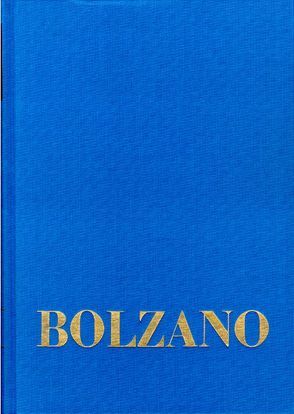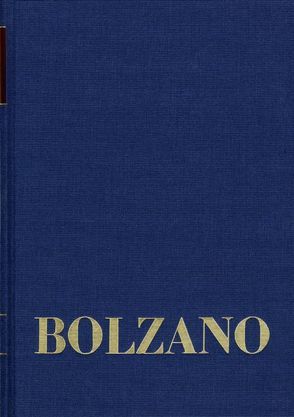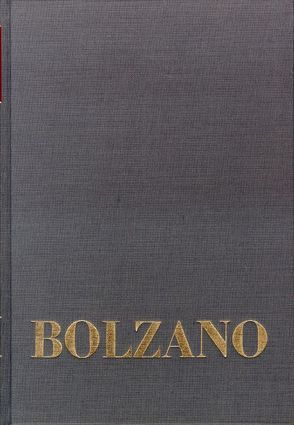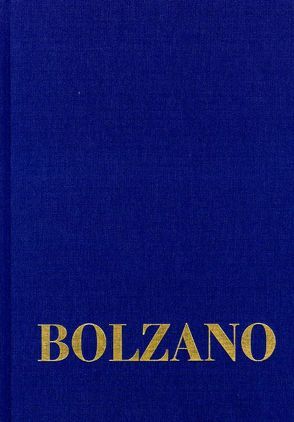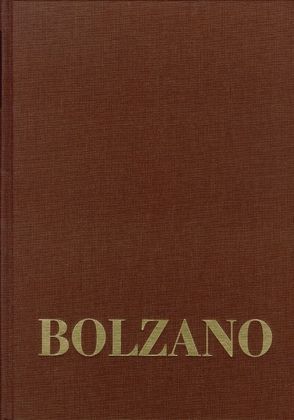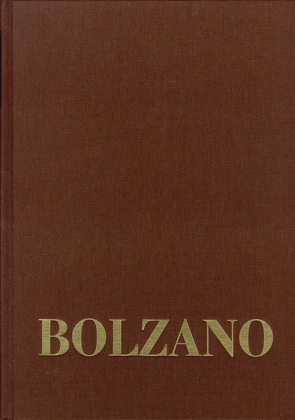
Mit dem Band 5,2 findet die Briefwechsel-Reihe III der Bolzano-Gesamtausgabe ihren Abschluß. Der Band bietet daher, was Bolzanos Briefpartner, aber auch die behandelten Themen betrifft, ein weniger einheitliches Bild als frühere Bände der Reihe. Bolzanos liebevoller Umgang mit Kindern und Jugendlichen zeigt sich in den Briefen an die Enkelin von Anna Hoffmann und an die kränkliche Rosalie von Neupauer. Die angespannte familiäre Atmosphäre in Bolzanos Elternhaus wird in den Briefen von und an Bolzanos Bruder Peter beleuchtet. Die fünf Briefe an Eduard von Badenfeld bieten Bolzano Gelegenheit, Fragen zu Themen der Ästhetik, Ethik und Metaphysik anzuschneiden. Von besonderer wissenschaftlicher Bedeutung ist ein Brief von Anton Slivka von Sliwitz mit vielen Formeln aus der Wahrscheinlichkeitstheorie; darin geht es um die Frage, welchen Zuverlässigkeitsgrad von Zeugen bestätigte historische Aussagen (für Bolzano besonders wichtig: Wunderberichte) erreichen können. So bietet dieser abschließende Band der Briefwechsel-Reihe neben wichtigen Ergänzungen zu Bolzanos Biographie auch einige Klarstellungen zu seinem wissenschaftlichen Werk.
Aktualisiert: 2022-08-18
> findR *
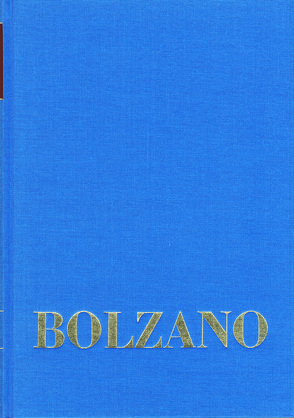
The ›Betrachtungen über einige Gegenstände der Elementargeometrie‹ marks the beginning of a life-long programme devoted to the re-organisation of geometry, and mathematics in general, according to Bolzano‹s own far-reaching methodological principles. Rejecting the concepts of motion, and of the plane, in the first part he proposes proofs of the »die ersten Lehrsätze von Dreiecken und Parallellinien« based only on his radical, and largely original second part: »einer künftig aufzustellenden Theorie der geraden Linie«. The first main part of the ›Beyträge zu einer begründeteren Darstellung der Mathematik‹ is devoted to the nature of mathematics and its proper classification. There is an unusually abstract definition of mathematics as »eine Wissenschaft … die von den allgemeinen Gesetzten (Formen) handelt, nach welchen sich diese Dinge in ihrem Daseyn richten« (I, §.8). The second part develops the methodological principles introduced in the ›Betrachtungen‹ in greater detail and introduces Bolzano‹s idea that, »in dem Inbegriffe aller wahren Urtheile herrscht ein gewisser Objectiver, von unserer zufälligen Subjectiven Anerkennung derselben unabhängiger Zusammenhang.« (II, §. 2) This relation [Abfolge] was to become an important theme of his famous later work 'Wissenschaftslehre! (1837). An Appendix criticises Kant‹s theory of the construction of mathematical concepts through pure intuition.
Aktualisiert: 2022-08-18
> findR *
INHALT: c. Prüfung der Philosophie des seligen Georg Hermes von einem Freunde der Ansichten Bolzano's, 1840.
Aktualisiert: 2022-08-18
> findR *
In Bolzano›s correspondence with the Royal Bohemian Society of Sciences there are, among other things, a long expert‹s report on the problem of solving algebraic equations higher than those of the fourth degree und several reports on Christian Doppler’s work in physics. In the last two essays, Bolzano puts Euclidean geometry on a topological foundation. His remarks culminate in a particular case, Jordan’s famous curve theorem, for which there are various ideas for proof in Bolzano’s manuscripts.
Aktualisiert: 2023-03-14
> findR *
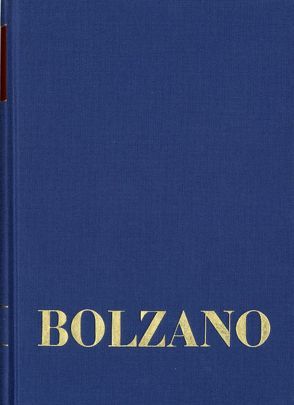
From 1805 to 1820, Bernard Bolzano was professor of »religious doctrine« (Religionslehre) at the University of Prague. The lectures he had to deliver were part of the so-called »Philosophical Studies« that every student of the university had to complete before he entered the »higher« studies, i.e. the studies of medicine, law or theology. As professor of religious doctrine, Bolzano also had the duty to deliver the homilies on Sundays and holidays during the academic year to all the students of the »Philosophical Studies«. This explains the enormous influence Bolzano exerted through these homilies on the intellectual and political life of Bohemia in his time, whose offshoots reached even the Charta 77 movement in former Czechoslovakia. The chairs of religious doctrine were established by the Austrian emperor Franz at all universities of the Austrian empire in order to shape the students into »good Christians and law-abiding citizens« as it was ordered in a decree. The homilies Bolzano had to deliver at the University of Prague (as did all professors of religious doctrine at Austrian universities) were called ›Erbauungsreden‹ (edifying addresses) or ›exhortations‹. There is evidence for 582 ›Erbauungsreden‹ Bolzano delivered as a professor at the University of Prague of which 414 are extant; of these, 153 have not yet been published at all. The 414 ›Erbauungsreden‹ that are extant have survived in different form: some of them (70) as autographs, i.e. in Bolzano’s own handwriting, others in handwritten copies of Bolzano’s manuscripts, others in notes taken by Bolzano’s students. Several collections of Bolzano’s ›Erbauungsreden‹ have already appeared in print, some of them during Bolzano’s lifetime, while others were published posthumously by his students or other editors. – The new critical edition of Bolzano’s ›Erbauungsreden‹ presents all of them in chronological order. Those which are extant will be edited on the basis of the best version which has remained. Those ›Erbauungsreden‹ which are not extant will be documented and described according to an index Bolzano himself has prepared.
Due to the increasing popularity of the edification speeches, 41 of the 51 speeches which Bolzano held in the academic year 1808/09 have been handed down as transcripts and 7 of them as written notes, most of them several times. Two of these are autographs. There are only three texts (numbers 1, 2 and 4) which were lost and these are documented in an autographic index. The ratio of homiletic speeches to generally edifying speeches was the opposite of the first four years (and remained this way until the end of Bolzano’s professional career): Approximately one third of the speeches dealt with exegesis, primarily on important church holidays, and two thirds dealt with educational, ideological and political subjects.
Aktualisiert: 2022-08-18
> findR *
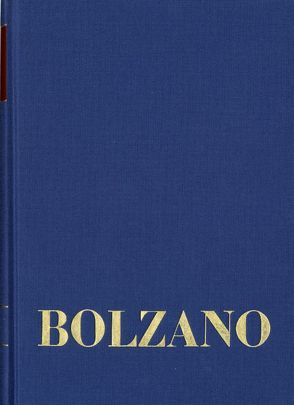
From 1805 to 1820, Bernard Bolzano was professor of »religious doctrine« (Religionslehre) at the University of Prague. The lectures he had to deliver were part of the so-called »Philosophical Studies« that every student of the university had to complete before he entered the »higher« studies, i.e. the studies of medicine, law or theology. As professor of religious doctrine, Bolzano also had the duty to deliver the homilies on Sundays and holidays during the academic year to all the students of the »Philosophical Studies«. This explains the enormous influence Bolzano exerted through these homilies on the intellectual and political life of Bohemia in his time, whose offshoots reached even the Charta 77 movement in former Czechoslovakia. The chairs of religious doctrine were established by the Austrian emperor Franz at all universities of the Austrian empire in order to shape the students into »good Christians and law-abiding citizens« as it was ordered in a decree. The homilies Bolzano had to deliver at the University of Prague (as did all professors of religious doctrine at Austrian universities) were called ›Erbauungsreden‹ (edifying addresses) or ›exhortations‹. There is evidence for 582 ›Erbauungsreden‹ Bolzano delivered as a professor at the University of Prague of which 414 are extant; of these, 153 have not yet been published at all. The 414 ›Erbauungsreden‹ that are extant have survived in different form: some of them (70) as autographs, i.e. in Bolzano’s own handwriting, others in handwritten copies of Bolzano’s manuscripts, others in notes taken by Bolzano’s students. Several collections of Bolzano’s ›Erbauungsreden‹ have already appeared in print, some of them during Bolzano’s lifetime, while others were published posthumously by his students or other editors. – The new critical edition of Bolzano’s ›Erbauungsreden‹ presents all of them in chronological order. Those which are extant will be edited on the basis of the best version which has remained. Those ›Erbauungsreden‹ which are not extant will be documented and described according to an index Bolzano himself has prepared.
Due to the increasing popularity of the edification speeches, 41 of the 51 speeches which Bolzano held in the academic year 1808/09 have been handed down as transcripts and 7 of them as written notes, most of them several times. Two of these are autographs. There are only three texts (numbers 1, 2 and 4) which were lost and these are documented in an autographic index. The ratio of homiletic speeches to generally edifying speeches was the opposite of the first four years (and remained this way until the end of Bolzano’s professional career): Approximately one third of the speeches dealt with exegesis, primarily on important church holidays, and two thirds dealt with educational, ideological and political subjects.
Aktualisiert: 2022-08-18
> findR *
Aktualisiert: 2022-08-18
> findR *
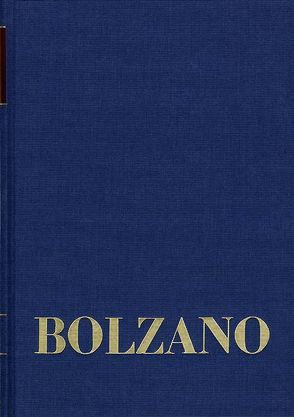
In the first speech he held after taking a break for two and a half years due to illness, Bernard Bolzano bemoaned the death of his sister Franziska, at whose sick bed his latent lung disease had gotten much worse and became life-threatening. He did however also announce that he was undaunted and would continue his comprehensive series of reforms, pointing out that there were still many new things, and things worth knowing, to be said and that with a combined effort it would certainly be possible to bring about an “improved shape of things.” While he was ill, Bolzano himself had begun, along with his friends and students, to organize, collect and transcribe the edification speeches he had held up to that time. The result of this is that all 45 speeches held in that academic year have been preserved, many of them even in several different transcriptions. In these speeches, Bolzano talks about conduct toward the “enemies of the Enlightenment”, about theatrical performances, musical art, the relationship between the two tribes in Bohemia and many other subjects.
Aktualisiert: 2022-08-18
> findR *
This volume contains the 20th part of the ›Miscellanea Mathematica‹ written between 1821 and 1826. In this diary, Bolzano deals in detail with the determination of the equation and the graphic representation of geometrically determined lines as well as with exercises from Lacroix’ Textbook on the Theory of Probability. He also studies the concepts of quantity, opposites, series,continuity, curvature, proof of Taylor’s theorem and the ratio of force to speed. In addition, diary number 20 contains mathematical applications for the shape of beehives, the shape of a megaphone and for the economical growing of trees.
Aktualisiert: 2022-08-18
> findR *
This volume contains those parts of the correspondence with the theologian Johann Baptist Stoppani, the grammar school teacher Gregor Zeithammer and the Swiss philosopher Johann Peter Romang which have survived. The correspondence between Bolzano and Stoppani are part of a more comprehensive correspondence on the perfectibility of Catholicism. For Bolzano, this correspondence signified the possibility of clarifying and supplementing many terms and arguments from his ‹Lehrbuch der Religionswissenschaft‹ (Textbook of the Science of Religion). Bolzano‹s letters to Zeithammer contain valuable references to the fate of his various writings. Bolzano‹s correspondence with Romang contains his instructions for a summary of the most important sections of the ‹Wissenschaftslehre‹ (Theory of Science), in which the most important paragraphs with the fundamental terms are highlighted.
Aktualisiert: 2023-03-14
> findR *
MEHR ANZEIGEN
Bücher von Edgar, Morscher
Sie suchen ein Buch oder Publikation vonEdgar, Morscher ? Bei Buch findr finden Sie alle Bücher Edgar, Morscher.
Entdecken Sie neue Bücher oder Klassiker für Sie selbst oder zum Verschenken. Buch findr hat zahlreiche Bücher
von Edgar, Morscher im Sortiment. Nehmen Sie sich Zeit zum Stöbern und finden Sie das passende Buch oder die
Publiketion für Ihr Lesevergnügen oder Ihr Interessensgebiet. Stöbern Sie durch unser Angebot und finden Sie aus
unserer großen Auswahl das Buch, das Ihnen zusagt. Bei Buch findr finden Sie Romane, Ratgeber, wissenschaftliche und
populärwissenschaftliche Bücher uvm. Bestellen Sie Ihr Buch zu Ihrem Thema einfach online und lassen Sie es sich
bequem nach Hause schicken. Wir wünschen Ihnen schöne und entspannte Lesemomente mit Ihrem Buch
von Edgar, Morscher .
Edgar, Morscher - Große Auswahl an Publikationen bei Buch findr
Bei uns finden Sie Bücher aller beliebter Autoren, Neuerscheinungen, Bestseller genauso wie alte Schätze. Bücher
von Edgar, Morscher die Ihre Fantasie anregen und Bücher, die Sie weiterbilden und Ihnen wissenschaftliche Fakten
vermitteln. Ganz nach Ihrem Geschmack ist das passende Buch für Sie dabei. Finden Sie eine große Auswahl Bücher
verschiedenster Genres, Verlage, Schlagworte Genre bei Buchfindr:
Unser Repertoire umfasst Bücher von
- Edgardis, Adrian
- Edgardis, Garlin
- Edgardis, Luna
- Edgarian, Carol
- Edgars, Silvia
- Edge, Brian
- Edge, Christopher
- Edge, David
- Edge, H.T.
- Edgelow, Megan
Sie haben viele Möglichkeiten bei Buch findr die passenden Bücher für Ihr Lesevergnügen zu entdecken. Nutzen Sie
unsere Suchfunktionen, um zu stöbern und für Sie interessante Bücher in den unterschiedlichen Genres und Kategorien
zu finden. Neben Büchern von Edgar, Morscher und Büchern aus verschiedenen Kategorien finden Sie schnell und
einfach auch eine Auflistung thematisch passender Publikationen. Probieren Sie es aus, legen Sie jetzt los! Ihrem
Lesevergnügen steht nichts im Wege. Nutzen Sie die Vorteile Ihre Bücher online zu kaufen und bekommen Sie die
bestellten Bücher schnell und bequem zugestellt. Nehmen Sie sich die Zeit, online die Bücher Ihrer Wahl anzulesen,
Buchempfehlungen und Rezensionen zu studieren, Informationen zu Autoren zu lesen. Viel Spaß beim Lesen wünscht Ihnen
das Team von Buchfindr.


